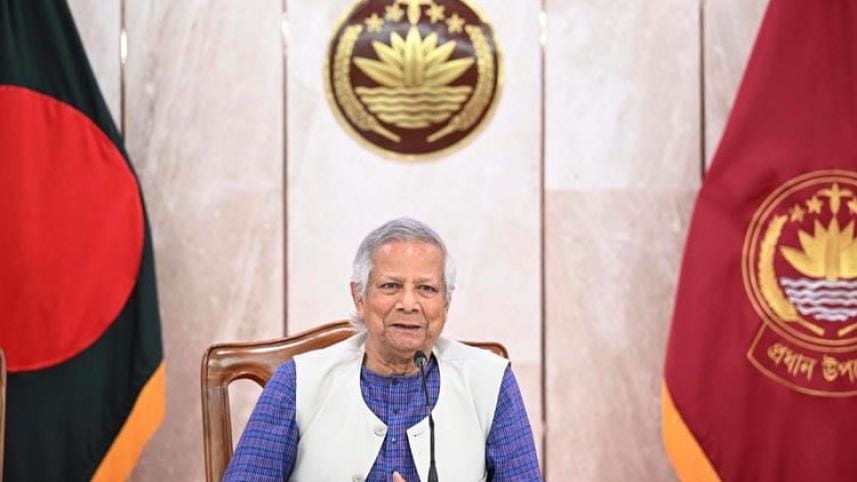Yunus’ China tour: Trade and investment top priority

Bangladesh is expecting to boost exports and bring investment and development support from China during Chief Adviser Prof Muhammad Yunus' first bilateral visit that will be watched closely by regional powers in the light of the changed Indo-Bangla ties.
Yunus' visit to China this year, which marks the 50th anniversary of China-Bangladesh diplomatic relations, was due and has symbolic significance, said Imtiaz Ahmed, executive director for Centre for Alternatives.
"There is no doubt that many would be watching Yunus' China visit from a geopolitical perspective, but we should look at it through the lens of our national interest," he said.
Indeed, Dhaka is more interested in enhancing economic cooperation and discussing regional challenges, including Rohingyas, The Daily Star has learnt from foreign ministry officials informed with the proceedings.
Dhaka and Beijing have been working on signing at least eight memoranda of understanding, including on trade, culture, modernisation of Mongla Port and water management during the four-day tour that begins on March 26.
"This would be a very successful, productive, and milestone visit with some announcements," Chinese Ambassador to Bangladesh Yao Wen told the media after a meeting with Foreign Secretary Jashim Uddin at the foreign ministry yesterday.
Dhaka will be making the same proposals as it did during Foreign Adviser Touhid Hossain's visit to China in January, said Mahfuz Kabir, research director at the Bangladesh Institute of International and Strategic Studies (BIISS).
During Touhid's January visit, he had requested lowering the interest rate on Chinese loans from 2-3 percent to 1 percent, waiving the commitment and management fees and extending the loan repayment period from 20 years to 30 years for both the preferential buyer's credit and government concessional loans.
The Chinse side had agreed in principle to extend the repayment period for Chinese loans and assured Dhaka of looking into the request to lower the interest rate.
However, it all depends on the strength of the negotiations, Kabir said.
"There could be some MoUs signed, but substantial boost in trade and investment or concessions in loans will largely depend on political stability, even though China maintains relations with any government of the time," said Imtiaz Ahmed, also a former professor of Dhaka University's international relations department.
Attracting Chinese investment to Bangladesh's Special Economic Zone in Chattogram will be a major agenda, said foreign ministry officials.
Bangladesh will encourage Chinese companies to relocate their factories to Bangladesh, especially the sunset companies as China faces global trade barriers, Chief Adviser's Press Secretary Shafiqul Alam told the media last week.
If these companies manufacture in Bangladesh, they can export without restrictions, he said.
China is the Bangladesh's largest trading partner, with the volume being $25 billion a year. However, Bangladesh's exports to China amount to less than $1 billion, though China provides Bangladesh with zero-tariff market access.
As part of the efforts to narrow the trade gap, China will be importing mango, guava, and jackfruit in big quantities, Yao said.
A new area of cooperation began with China since Touhid's visit in medical tourism, at a time when India has substantially tightened visas for Bangladeshis.
He had requested China to dedicate hospitals for Bangladeshi patients in Kunming. The first batch of 14 patients went to China in early March this year.
Dhaka has also proposed that China should set up a high-quality hospital chain in Bangladesh, a proposal that is being positively considered by China, a foreign ministry official said.
The establishment of high-quality hospitals in Bangladesh will be a milestone in Sino-Bangla relations, Prof said.
River water management will be another agenda during Yunus' visit, according to foreign ministry officials.
In 2023, China proposed implementing the Teesta river management project in phases, but Bangladesh did not go ahead with it.
Yao recently told the media that China was ready to implement the project.
Dhaka may also raise the issue of China's plan to build a mega-hydropower dam across the Yarlung Tsangpo River in Tibet, which can have implications on the lower riparian countries, including India and Bangladesh.
According to the officials concerned, China will propose that Bangladesh should join the Global Development Initiative and Global Security Initiative.
Dhaka may not go for any project that stoke geopolitical tension, said Kabir of BIISS.
"Also, the fact that this is an interim government, it may think twice before going for any such issue," he added.
Dhaka will definitely seek China's strong role in addressing the Rohingya crisis that has become complicated with the Arakan Army taking control of about 90 percent of Rakhine state, said a foreign ministry official.
"Something like the Marshall Plan is required for addressing the Rohingya crisis, and a global or regional approach would work better towards this end. Similarly, there may be a consortium of different countries to address the Teesta water issue," Prof Imtiaz said.




 For all latest news, follow The Daily Star's Google News channel.
For all latest news, follow The Daily Star's Google News channel.
Comments